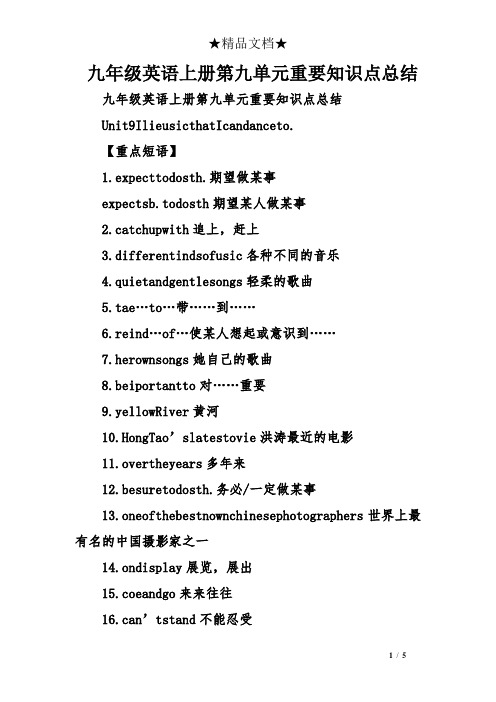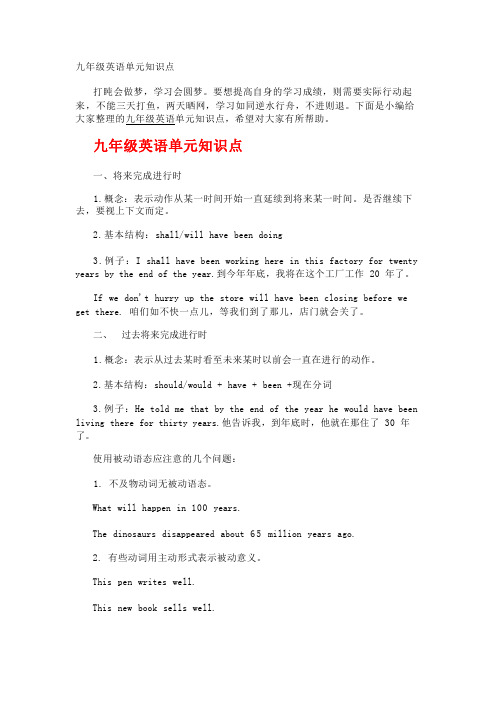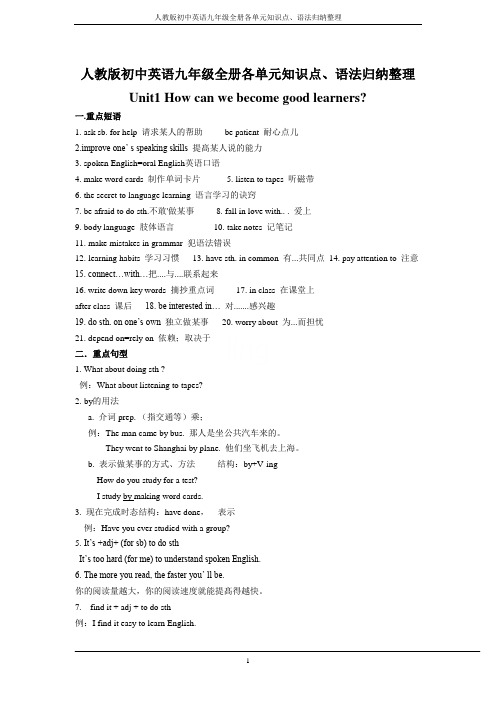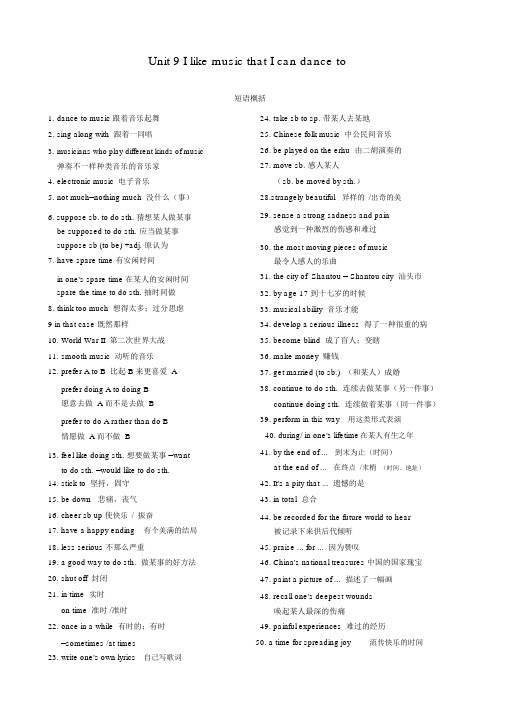九英语单元知识点总结
人教版九年级英语第九单元知识点总结

人教版九年级英语第九单元知识点总结Unit 9 I like music that I can dance to. 单词 Prefer lyrics Australia electronic suppose smooth spare director case in that case war stick Stick to to shut shut shut off down down dialog dialog ending documentary dram plenty of of superhero superhero sadness pain moving lifetime pity total in total master recall wound painful once in a while intelligent sense. reflect .perform praise 一.1. dance to music 随着音乐起舞 2. sing along with 随着……一起唱 3. musicians who play play different different kinds kinds of of music music 弹奏不同类型音乐的音乐家 4. 4. electronic electronic music music 电子音乐 5. not much=nothing much 没什么(事) 6. suppose sb. to do sth. 猜想某人做某事 be supposed supposed to to do do sth. sth. 应该做某事 suppose suppose sb sb (to (to be) be) +adj. +adj. 原以为某人是…… 7. 7. have have spare time 有空闲时间 in one's spare time 在某人的空闲时间 spare the time to do sth. 抽时间做…… 8. 8. think think too too much much 想得太多;过度思考 9 9 in in that that case case 既然那样 10. World War II 第二次世界大战 11. smooth music 悦耳的音乐 12. prefer A to B 比起B 来更喜欢A prefer doing A to to doing doing B 愿意去做A 而不是去做B prefer to to do do A A rather than than do do B B 宁愿做A 而不做B 13. 13. feel feel like like doing doing sth. sth. 想要做某事 =want =want to to do do sth. sth. =would like to do sth. 14. stick to 坚持,固守 15. be down 悲哀,沮丧 16. cheer sb up 使…高兴/ 振奋 17. 17. have have a a happy happy ending 有个美满的结局 18. 18. less less serious serious 不那么严重 19. a good way to do sth. 做某事的好办法 20. shut off 关闭 21. in time 及时on time 按时/准时 22. once in a while 偶尔的;有时 =sometimes /at times 23. write one's own lyrics 自己写歌词24. 24. take take sb sb to to sp. sp. 带某人去某地 25. 25. Chinese Chinese folk folk music music 中国民间音乐 26. 26. be be played played on on the the erhu 由二胡演奏的 27. 27. move move sb. sb. 感动某人 (sb. sb. be be moved moved by by sth.sth.) 28.strangely beautiful 异常的/出奇的美 29. sense a strong sadness and pain 感觉到一种强烈的伤感和痛苦 30. the most moving pieces of music 最令人感动的乐曲 31. the city of Shantou = Shantou city 汕头市 32. by age 17 到十七岁的时候 33. musical ability 音乐才能 34. develop a serious illness 得了一种很重的病 35. become blind 成了盲人;变瞎 36. make money 赚钱 37. get married (to sb.) (和某人)结婚 38. continue to do sth. 继续去做某事(另一件事) continue doing sth. 继续继续做着某事(同一件事) 39. perform in this way 用这种形式表演 40. 40. during/ during/ in in one's one's lifetime lifetime 在某人有生之年 41. 41. by by the the end end of ... of ... 到……末为止(时间) at the end of ... 在……尽头/末梢(时间、地点) 42. It's a pity that ... 遗憾的是…… 43. in total 总共 44. be recorded for the future world to hear 被记录下来供后人聆听 45. praise ... for ... 因为……赞美 46. China's national treasures 中国的国家珍宝 47. 47. paint paint a a picture picture of of ... ... 描绘了一幅……画 48. 48. recall recall one's one's deepest deepest wounds 唤起某人最深的伤痛 49. painful experiences 痛苦的经历 50. a time for spreading joy 传播快乐的时间51. 51. live live a a very very hard hard life.过着艰苦的生活。
九年级英语上册单元重要知识点总结

九年级英语上册单元重要知识点总结九年级英语上册共有8个单元,包括Unit 1 My New Teachers、Unit 2 How Often Do You Exercise、Unit 3 I'm more outgoing than my sister、Unit 4 Don't eat in class、Unit 5 What are the shirts made of、Unit 6 I'm going to study computer science、Unit 7 Would you mind turning down themusic、Unit 8 How do you make a banana milk shake?下面对每个单元的重要知识点进行总结:Unit 1 My New Teachers1.介绍自己和他人的基本信息,包括姓名、年龄、学校、家庭成员等。
2.学习询问他人的基本信息,如What's his/her name? How old is he/she?Which school does he/she go to?等。
3.学习询问他人的职业和爱好,如What does he/she do? What are his/herhobbies?等。
4.学习表达个人的职业和爱好,如I'm a student. My hobbies are playingbasketball and listening to music.等。
Unit 2 How Often Do You Exercise1.学习询问他人的日常活动频率,如How often do you exercise? Howoften does he/she watch TV?等。
2.学习回答关于日常活动频率的问题,如I exercise three times a week.He/She watches TV every day.等。
九年级英语上册各单元知识点归纳

九年级英语上册各单元知识点归纳第一单元:基础知识1. 介词短语的使用:介词短语是由一个介词和它的宾语组成的短语,用来表示时间、地点、方向、原因等。
例如:"on the table"(在桌子上),"in the park"(在公园里)。
介词短语在句子中作状语、定语、宾语等。
需要注意介词与宾语之间的搭配。
2. 动词的时态和语态:英语中的动词有多种时态和语态。
常见的时态有一般现在时、一般过去时、一般将来时等。
常见的语态有主动语态和被动语态。
时态用于表示动作发生的时间,语态用于表示动作的执行者。
例如:"She is reading a book."(她正在读一本书)。
需要注意时态和语态的用法和变化规则。
3. 名词的单复数形式:英语中的名词有单数和复数形式。
复数形式一般是在名词后面加-s或-es。
有些名词的复数形式较特殊,需要记忆。
例如:"a cat"(一只猫)的复数形式是"cats"(多只猫)。
需要注意名词的单复数形式在句子中的搭配和用法。
第二单元:阅读理解1. 完型填空:完型填空是一种考察学生对语境理解和词汇运用能力的题型。
在完型填空中,通常给出一篇文章和一些空格,要求学生根据文章内容和语境选择正确的单词或短语填入空格中。
通常需要结合文章整体逻辑和上下文意义来填写正确答案。
2. 阅读理解题:阅读理解题是一种考察学生阅读理解能力和推理能力的题型。
通常会给出一篇短文或文章,然后根据文章内容提出一些问题,要求学生根据文章内容和推理来回答问题。
需要学会熟练阅读和理解文章,抓住关键信息和主题,并能运用推理等能力来回答问题。
第三单元:语法知识1. 直接引语和间接引语:在英语中,当我们引述别人的话时,可以使用直接引语和间接引语。
直接引语是直接引用别人所说的话,使用引号将其包围;间接引语是将别人所说的话转述出来。
例如:直接引语:"I am happy," she said.(她说:“我很开心。
九年级英语单元知识点总结

由“助动词be +及物动词的过去分词”构成助动词be 有人称、数和时态的变化,其变化规则与be 作为连系动词时完全一样。
时态被动语态结构例句一般现在时 amare +过去分词isEnglish is spoken inmany countries.一般过去时 was +过去分词 were + 过去分词 This bridge was built in 1989.情态动词 can/shouldmay +be+过去分词must/……The work must be doneright now.③被动语态的用法当我们不知道谁是动作的执行者,或者没有必要指出谁是动作的执行者,或者只需强调动作的承受者时,要用被动语态。
2. allow sb. to do sth. 允许某人做某事(主动语态)如:Mother allows me to watch TV every night. 妈妈允许我每晚看电视。
be allowed to do sth. 被允许做某事(被动语态)如: LiLy is allowed to go to Qinzhou. 莉莉被允许去钦州。
3. get their ears pierced 穿耳洞让/使(别人)做某事 get sth. done(过去分词)have sth. done 如:I get my car repaired. == I have my car repaired. 我让别人修好我的车 I want to have my hair cut. 我要理发. 4. enough 足够形容词+enough 如:beautiful enough 足够漂亮 enough+名词如:enough food 足够食物 enough to 足够…去做…如:I have enough money to go to Beijing. 我有足够的钱去北京。
She is old enough to go to school.她够大去读书了。
九年级英语上册第九单元重要知识点总结

九年级英语上册第九单元重要知识点总结九年级英语上册第九单元重要知识点总结Unit9IlieusicthatIcandanceto.【重点短语】1.expecttodosth.期望做某事expectsb.todosth期望某人做某事2.catchupwith追上,赶上3.differentindsofusic各种不同的音乐4.quietandgentlesongs轻柔的歌曲5.tae…to…带……到……6.reind…of…使某人想起或意识到……7.herownsongs她自己的歌曲8.beiportantto对……重要9.yellowRiver黄河10.HongTao’slatestovie洪涛最近的电影11.overtheyears多年来12.besuretodosth.务必/一定做某事13.oneofthebestnownchinesephotographers世界上最有名的中国摄影家之一14.ondisplay展览,展出15.coeandgo来来往往16.can’tstand不能忍受【重点句型】1.Ilovesingerswhowritetheirownusic.我喜欢自己创作曲子的歌手。
2.Wepreferusicthathasgreatlyrics.我们更喜欢歌词很棒的音乐。
3.WhatdoyoudislieaboutthiscD.你不喜欢这张cD的什么?4.Whatdoesitreindyouof?它使你想起了什么?5.TheusicreindseofBraziliandanceusic.这首曲子使我想起了巴西舞曲。
6.Itdoeshaveafewgoodfeatures,though.然而,它的确也有一些好的方面。
7.Shereallyhassoethingforeveryone.每个人的确都能从她的作品中领悟到一些东西。
8.Whateveryoudo,don’tissthisexhibition.无论怎样,你都不能错过这个展览会。
九年级英语单元知识点

九年级英语单元知识点打盹会做梦,学习会圆梦。
要想提高自身的学习成绩,则需要实际行动起来,不能三天打鱼,两天晒网,学习如同逆水行舟,不进则退。
下面是小编给大家整理的九年级英语单元知识点,希望对大家有所帮助。
一、将来完成进行时1.概念:表示动作从某一时间开始一直延续到将来某一时间。
是否继续下去,要视上下文而定。
2.基本结构:shall/will have been doing3.例子:I shall have been working here in this factory for twenty years by the end of the year.到今年年底,我将在这个工厂工作 20 年了。
If we don't hurry up the store will have been closing before we get there. 咱们如不快一点儿,等我们到了那儿,店门就会关了。
二、过去将来完成进行时1.概念:表示从过去某时看至未来某时以前会一直在进行的动作。
2.基本结构:should/would + have + been +现在分词3.例子:He told me that by the end of the year he would have been living there for thirty years.他告诉我,到年底时,他就在那住了 30 年了。
使用被动语态应注意的几个问题:1. 不及物动词无被动语态。
What will happen in 100 years.The dinosaurs disappeared about 65 million years ago.2. 有些动词用主动形式表示被动意义。
This pen writes well.This new book sells well.3. 感官动词或使役动词使用省略 to 的动词不定式,主动语态中不带 to ,但变为被动语态时,须加上 to 。
人教版初中英语九年级全册各单元知识点、语法归纳整理

人教版初中英语九年级全册各单元知识点、语法归纳整理Unit1 How can we become good learners?一.重点短语1. ask sb. for help 请求某人的帮助be patient 耐心点儿2.improve one’ s speaking skills 提髙某人说的能力3. spoken English=oral English英语口语4. make word cards 制作单词卡片5. listen to tapes 听磁带6. the secret to language learning 语言学习的诀窍7. be afraid to do sth.不敢'做某事8. fall in love with.. . 爱上9. body language 肢体语言10. take notes 记笔记11.make mistakes in grammar 犯语法错误12.learning habits 学习习惯13. have sth. in common 有...共同点14. pay attention to 注意15. connect…with…把....与....联系起来16. write down key words 摘抄重点词17. in class 在课堂上after class 课后18. be interested in… 对.......感兴趣19. do sth. on one’s own 独立做某事20. worry about 为...而担忧21. depend on=rely on 依赖;取决于二.重点句型1. What about doing sth ?例:What about listening to tapes?2.by的用法a. 介词 prep. (指交通等)乘;例:The man came by bus. 那人是坐公共汽车来的。
(完整版)人教版新目标英语九年级Unit9单元知识点小结

Unit 9 I like music that I can dance to1.dance to music 跟着音乐起舞2.sing along with 跟着一同唱3.musicians who play different kinds of music弹奏不一样种类音乐的音乐家4.electronic music 电子音乐5.not much=nothing much 没什么(事)6.suppose sb. to do sth. 猜想某人做某事be supposed to do sth. 应当做某事suppose sb (to be) +adj. 原认为7.have spare time 有安闲时间in one's spare time 在某人的安闲时间spare the time to do sth. 抽时间做8.think too much 想得太多;过分思虑9 in that case 既然那样10.World War II 第二次世界大战11.smooth music 动听的音乐12.prefer A to B 比起 B 来更喜爱 Aprefer doing A to doing B愿意去做 A 而不是去做 Bprefer to do A rather than do B情愿做 A 而不做 B13.feel like doing sth. 想要做某事 =wantto do sth. =would like to do sth.14.stick to 坚持,固守15.be down 悲痛,丧气16.cheer sb up 使快乐/振奋17. have a happy ending有个美满的结局18.less serious 不那么严重19.a good way to do sth. 做某事的好方法20.shut off 封闭21.in time 实时on time 准时 /准时22.once in a while 有时的;有时=sometimes /at times23. write one's own lyrics自己写歌词短语概括24.take sb to sp. 带某人去某地25.Chinese folk music 中公民间音乐26.be played on the erhu 由二胡演奏的27.move sb. 感人某人(sb. be moved by sth.)28.strangely beautiful异样的/出奇的美29.sense a strong sadness and pain感觉到一种激烈的伤感和难过30.the most moving pieces of music最令人感人的乐曲31.the city of Shantou = Shantou city 汕头市32.by age 17 到十七岁的时候33.musical ability 音乐才能34.develop a serious illness 得了一种很重的病35.become blind 成了盲人;变瞎36.make money 赚钱37.get married (to sb.) (和某人)成婚38.continue to do sth. 连续去做某事(另一件事)continue doing sth. 连续做着某事(同一件事)39. perform in this way用这类形式表演40. during/ in one's lifetime在某人有生之年41.by the end of ... 到末为止(时间)at the end of ... 在终点/末梢(时间、地址)42.It's a pity that ... 遗憾的是43.in total 总合44.be recorded for the future world to hear被记录下来供后代倾听45.praise ... for ... 因为赞叹46.China's national treasures 中国的国家瑰宝47.paint a picture of ... 描述了一幅画48.recall one's deepest wounds唤起某人最深的伤痛49.painful experiences 难过的经历50. a time for spreading joy流传快乐的时间句子重难点分析1. Hmm, depends which movie.嗯,那要看是哪部电影了。
- 1、下载文档前请自行甄别文档内容的完整性,平台不提供额外的编辑、内容补充、找答案等附加服务。
- 2、"仅部分预览"的文档,不可在线预览部分如存在完整性等问题,可反馈申请退款(可完整预览的文档不适用该条件!)。
- 3、如文档侵犯您的权益,请联系客服反馈,我们会尽快为您处理(人工客服工作时间:9:00-18:30)。
1九年级英语知识点汇总Unit11. by + doing 通过……方式如:by studying with a group by 还可以表示:“在…旁”、“靠近”、“在…期间”、“用、”“经过”、“乘车”等如:I live by the river. I have to go back by ten o’clock. The thief entered the room by the window.The student went to park by bus.2. talk about 谈论,议论,讨论如:The students often talk about movie after class. 学生们常常在课后讨论电影。
talk to sb. === talk with sb. 与某人说话 3. 提建议的句子:①What/ how about +doing sth.?如:What/ How about going shopping? ②Why don’t you + do sth.? 如:Why don’t you go shopping? ③Why not + do sth. ? 如:Why not go shopping? ④Let’s + do sth. 如:Let’s go shopping⑤Shall we/ I + do sth.? 如:Shall we/ I go shopping? 4. a lot 许多常用于句末如:I eat a lot. 我吃了许多。
5. too…to 太…而不能常用的句型too+adj./adv. + to do sth.如:I’m too tired to say anything. 我太累了,什么都不想说。
6. aloud, loud与loudly的用法三个词都与"大声"或"响亮"有关。
①aloud是副词,重点在出声能让人听见,但声音不一定很大, 常用在读书或说话上。
通常放在动词之后。
aloud没有比较级形式。
如: He read the story aloud to his son.他朗读那篇故事给他儿子听。
②loud可作形容词或副词。
用作副词时,常与speak, talk, laugh等动词连用,多用于比较级,须放在动词之后。
如: She told us to speak a little louder. 她让我们说大声一点。
③loudly是副词,与loud同义,有时两者可替换使用,但往往含有令人讨厌或打扰别人的意思,可位于动词之前或之后。
如: He does not talk loudly or laugh loudly in public. 他不当众大声谈笑。
7. not …at all 一点也不根本不如:I like milk very much. I don’t like coffee at all. 我非常喜欢牛奶。
我一点也不喜欢咖啡。
not经常可以和助动词结合在一起,at all 则放在句尾8. be / get excited about sth.=== be / get excited about do ing sth. === be excited to do sth. 对…感兴奋如:I am / get excited about going to Beijing.===I am excited to go to Beijing. 我对去北京感到兴奋。
9. ①end up doing sth 终止做某事,结束做某事如:The party ended up singing. 晚会以唱歌而结束。
②end up with sth. 以…结束如:The party ended up with her singing. 晚会以她的歌唱而告终。
10. first of all 首先. to begin with 一开始later on 后来、随11. also 也、而且(用于肯定句)常在句子的中间either 也(用于否定句)常在句末too 也(用于肯定句) 常在句末12. make mistakes 犯错如:I often make mistakes. 我经常犯错。
make a mistake 犯一个错误如:I have made a mistake.我已经犯了一个错误。
13. laugh at sb. 笑话;取笑(某人)如:Don’t laugh at me!不要取笑我! 14. take notes 做笔记,做记录15. enjoy doing sth . 喜欢做…乐意做…如:She enjoys playing football. 她喜欢踢足球。
enjoy oneself 过得愉快如:He enjoyed himself. 他过得愉快。
16. native speaker 说本族语的人17. make up 组成、构成18. one of +(the+ 形容词比较级)+名词复数形式…其中之一如:She is one of the most popular teachers.她是最受欢迎的教师之一。
19. It’s +形容词+(for sb. ) to do sth. (对于某人来说)做某事…如:It’s difficult (for me ) to study English. 对于我来说学习英语太难了。
句中的it 是形式主语,真正的主语是to study English 20. practice doing 练习做某事如:She often practice speaking English. 她经常练习说英语。
21. decide to do sth. 决定做某事如:LiLei has decided to go to BeiJing . 李雷已经决定去北京。
22. unless 假如不,除非引导条件状语从句如:You will fail unless you work hard..假如你不努力你会失败。
I won’t write unless he writes first. 除非他先写要不我不写23. deal with 处理如:I dealt with a lot of problem. 24. worry about sb./ sth. 担心某人/ 某事如:Mother worried about his son just now.妈妈刚才担心他的儿子。
25. be angry with sb. 对某人生气如:I was angry with her. 我对她生气。
26. perhaps === maybe 也许27. go by (时间) 过去如:Two years went by. 两年过去了。
28. see sb. / sth. doing 看见某人正在做某事强调正在发生see sb. / sth. do 看见某人在做某事如:如:She saw him drawing a picture in the classroom.她看见他正在教室里画画。
29. each other 彼此30. regard…as …把…看作为…. 如:The boys regarded Anna as a fool. 这些男孩把安娜看成傻瓜。
31. too many 许多修饰可数名词如:too many girlstoo much 许多修饰不可数名词如:too much milk much too 太修饰形容词如:much too beautiful 32. change…into…将…变为…如:The magician changed the pen into a book. 这个魔术师将这本书变为一本书。
33. with the help of sb. == with one’s help 在某人的帮助下如:with the help of LiLei == with LiLei’s help 在李雷的帮助下34. compare …to …把…与…相比如:Compare you to Anna, you are lucky. 你和安娜相比,你是幸运的。
35. instead 代替用在句末,副词(字面上常不译出来)instead of sth. / doing sth. 代替,而不是用在句中,动词如:Last summer I went to Beijing. This year I’m going to Shanghai instead.去年夏天我去北京, 今年我将要去上海。
I will go instead of you. 我将代替你去。
He stayed at home instead of going swimming.他呆在家里而不是去游泳。
九年级英语Unit21. used to do sth. 过去常常做某事否定形式:didn’t use to do sth. / used not to do sth.如:He used to play football after school. 放学后他过去常常踢足球。
Did he use to play football? Yes, I did. No, I didn’t. He didn’t use to smoke. 他过去不吸烟。
2. 反意疑问句①肯定陈述句+否定提问如:Lily is a student, isn’t she? Lily will go to China, won’t she? ②否定陈述句+肯定提问如:She doesn’t come from China, does she? You haven’t finished homework, have you?③提问部分用代词而不用名词Lily is a student, isn’t she?④陈述句中含有否定意义的词,如:little, few, never, nothing, hardly等。
其反意疑问句用肯定式。
如:He knows little English, does he? 他一点也不懂英语,不是吗?They hardly understood it, did they?他们几乎不明白,不是吗? 3. play the piano 弹钢琴4. ①be interested in sth. 对…感兴趣②be interested in doing sth. 对做…感兴趣如:He is interested in math, but he isn’t interested in speaking English. 他对数学感兴趣,但是他对说英语不感兴趣。
